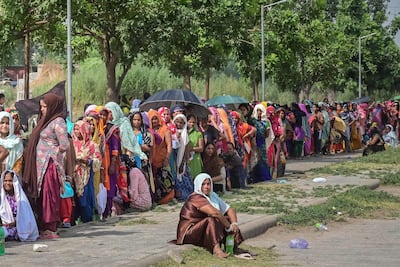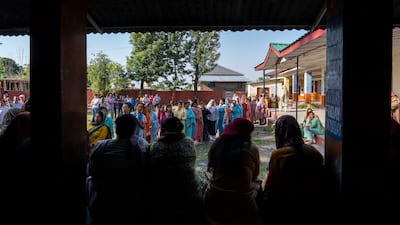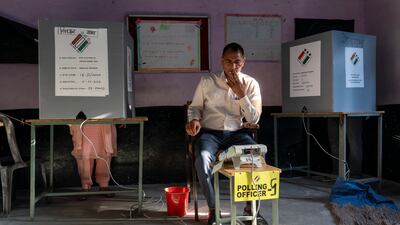Voting in the world's largest elections concluded in India on Saturday as millions cast their ballots in the last phase of the country's six-week long polls. Prime Minister Narendra Modi has a strong lead in several exit polls and is widely expected to secure another five-year term after a decade in power.
India began the staggered seven-phase election with the 543 seats in the Lok Sabha – the lower house of Parliament – in April.
A political party or an alliance of parties would need 272 seats to form a government.
Polling was held in 57 constituencies in the final round on Saturday.
While some 100 million voters were eligible to cast their votes, a turnout of almost 60 per cent was recorded during the final stage, the Election Commission of India said.
While about 970 million voters across India's 28 states and eight federally administered territories – a bigger electorate than the US and the EU combined - were eligible for voting, a turnout of no more than 66 per cent has been registered this year.
More than 5.5 million voting machines were used in the election, compared with about 1.8 million in the 2019 election.
Polling was held seats across Himachal Pradesh, Punjab, West Bengal, Bihar, Odisha, Jharkhand and Uttar Pradesh, where Mr Modi is contesting from the Varanasi constituency.
The results will be announced on June 4, with Mr Modi expected to win a third term in office.
Several opinion polls have put Mr Modi, 73, and his right-wing ruling Bharatiya Janata Party ahead of its rivals.
He has won two previous polls from the Hindu holy city.
About 900 other candidates including Bollywood actress-turned-politician Kangana Ranaut are in the fray in the final phase.
Ms Ranaut, who is making her political debut, is fighting on a BJP ticket in the Mandi constituency in Himachal Pradesh. She is up against Congress leader Vikramaditya Singh.
Clashes were reported between regional political party workers in Kolkata, in the eastern state of West Bengal.
An angry mob barged into a polling station in the state's South 24 Parganas district and stole polling machines over claims that some agents were denying voters entry.
They threw part of an electronic voting machine into a pond, the state's chief electoral office said.

Modi maintains popularity
“Today is the final phase of the 2024 Lok Sabha elections,” Mr Modi said on X. “As 57 seats across eight states and UTs [union territories] go to the polls, calling upon the voters to turnout in large numbers and vote. I hope young and women voters exercise their franchise in record numbers. Together, let’s make our democracy more vibrant and participative.”
Before the final phase, Mr Modi went for a meditation break at Vivekananda Rock Memorial, a site off the southernmost tip of India, considered sacred and where Hindu philosopher and reformist Swami Vivekananda had meditated for two days in 1892.
Mr Modi has maintained popularity among the majority Hindu community in large part as a result of his image as a champion of the faith.

The BJP has launched a Once Again Modi campaign as his government highlights its goal of Viksit Bharat – Developed India – to make the country a fully developed nation by 2047.
Mr Modi’s party has also pledged to end religion-based civil laws that govern marriages, divorces, and properties and bring a uniform law for all the communities that Muslims say target them. The right-wing party, s election campaign sparked widespread criticism after Mr Modi used troupes of infiltrators and baby producers for Muslim in a highly divisible campaign
The party has also promoted the construction of Ram Temple as one of its biggest achievements of Mr Modi's second term.
The temple, built on the site of the 16th-century Babri Masjid mosque, opened in January after decades of legal wrangling following its demolition by supporters of the BJP and other Hindu right-wing groups in 1992.
Gandhi pushes for coalition win
The opposition is composed of a coalition of 26 national and regional parties called the INDIA bloc, led by Indian National Congress, a party that lost power to Mr Modi in 2014 after a decade-long reign. Its electoral fortunes have since declined.
The INC, better known as Congress, is led by Rahul Gandhi who has challenged Mr Modi by promoting an agenda of “justice”.
The party has promised minimum wages, employment opportunities and the freedom to practise personal choices in dress, food, language and laws for people, particularly from religious minority communities.
India, a diverse and multi-faith nation of 1.4 billion people, allows its religious and other ethnic communities to follow their scriptures and traditions for marriage, divorce, inheritance and adoption.
More than 970 million people were eligible to vote but an average of around 66 per cent of the voters have participated in the process to elect a new government.
In February, the Centre for Media Studies in New Delhi said the cost of this year's election would be about 1.2 trillion rupees, or $14.4 billion.







